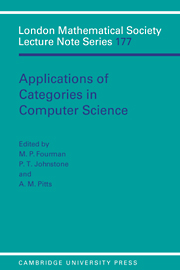 Applications of Categories in Computer Science
Applications of Categories in Computer Science Book contents
- Frontmatter
- Contents
- Preface
- Miscellaneous Frontmatter
- Computational comonads and intensional semantics
- Weakly distributive categories
- Sequentiality and full abstraction
- Remarks on algebraically compact categories
- Dinaturality for free
- Simply typed and untyped lambda calculus revisited
- Modelling reduction in confluent categories
- On clubs and data-type constructors
- Penrose diagrams and 2-dimensional rewriting
- Strong monads, algebras and fixed points
- Semantics of local variables
- Using fibrations to understand subtypes
- Reasoning about sequential functions via logical relations
- I-categories and duality
- Geometric theories and databases
- Partial products, bagdomains and hyperlocal toposes
Strong monads, algebras and fixed points
Published online by Cambridge University Press: 24 September 2009
- Frontmatter
- Contents
- Preface
- Miscellaneous Frontmatter
- Computational comonads and intensional semantics
- Weakly distributive categories
- Sequentiality and full abstraction
- Remarks on algebraically compact categories
- Dinaturality for free
- Simply typed and untyped lambda calculus revisited
- Modelling reduction in confluent categories
- On clubs and data-type constructors
- Penrose diagrams and 2-dimensional rewriting
- Strong monads, algebras and fixed points
- Semantics of local variables
- Using fibrations to understand subtypes
- Reasoning about sequential functions via logical relations
- I-categories and duality
- Geometric theories and databases
- Partial products, bagdomains and hyperlocal toposes
Summary
Introduction
There has been considerable recent interest in the use of algebraic methodologies to define and elucidate constructions in fixed point semantics [B], [FMRS], [Mu2]. In this paper we present recent results utilizing categorical methods, particularly strong monads, algebras and dinatural transformations to build general fixed point operators. The approach throughout is to evolve from the specific to the general case by eventually discarding the particulars of domains and continuous functions so often used in this setting. Instead we rely upon the structure of strong monads and algebras to provide a general algebraic framework for this discussion. This framework should provide a springboard for further investigations into other issues in semantics.
By way of background, the issues raised in this paper find their origins in several different sources. In [Mu2] the formal role of iteration in a cartesian closed category (ccc) with fixed points was investigated. This was motivated by the observation in [H-P] that the presence of a natural number object (nno) was inconsistent with ccc's and fixed points. This author introduced the notion of onno (ordered nno) which in semantic categories played a role as iterator and was precisely the initial T-algebra for T the strong lift monad. Using the onno a factorization of fix was produced and further it was shown fix was in fact a dinatural transformation. This was accomplished by avoiding the traditional projection/embedding approach to semantics. Similar results were extended to order-enriched and effective settings as well.
Turning to monads, their role in computation is not new. In particular, it was emphasized early in the development of topos theory that the partial map classifier was a strong monad.
- Type
- Chapter
- Information
- Applications of Categories in Computer ScienceProceedings of the London Mathematical Society Symposium, Durham 1991, pp. 202 - 216Publisher: Cambridge University PressPrint publication year: 1992
- 8
- Cited by


